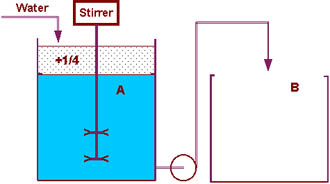| |
In a variant with 4 steps, after addition of 1/4 of water to 4/4 of solution the dilution factor is 5/4 (1.25). After a repetition the dilution factor is
1.25 * 1.25. A total of 4 steps are possible until the equal-sized vessel B is full. |
| |
Total dilution factor with vessel B full to the brim: |
| |
With 4 steps: |
1.254 = (1 + 1/4)4 |
= 2.44 |
| |
With 10 steps: |
1.110 = (1 + 1/10)10 |
= 2.59 |
| |
With 100 steps: |
(1 + 1/100)100 |
= 2.70 |
| |
With 1000 steps: |
(1 + 1/1000)1000 |
= 2.72 |
| |
Up to infinite steps: |
(1 + 1/n)n |
= 2.718.. |
| |
The result is e and this formula is given in encyclopaedias,
rather than the formula 1/e = (1 - 1/n)n, which was found in the "nut to crack". |




